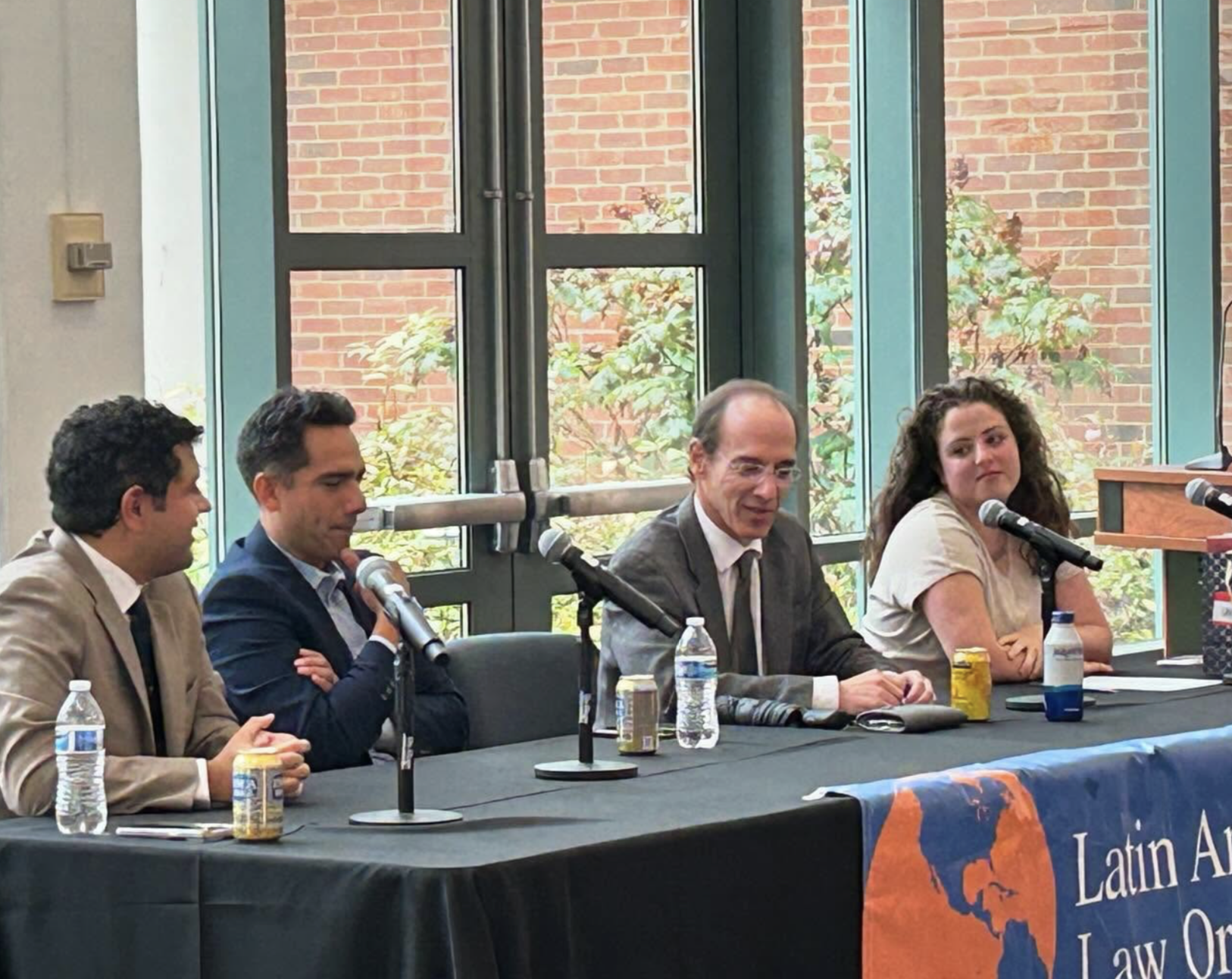Judge David Bernhard Visits During Hispanic Heritage Month
Source: LALO
Last Thursday, September 18, the Latin American Law Organization (LALO) hosted a conversation with Judge David Bernhard, a sitting justice on the Court of Appeals of Virginia. In 2017, Judge Bernhard became the first Hispanic judge to serve on a Virginia circuit court.[1] On March 7, 2024, Judge Bernhard again made history as the first immigrant and first Hispanic and Latino American to be elected by the General Assembly to an appellate court in Virginia. His eight-year term on the appellate court began on January 1, 2025. The conversation was moderated by Allie Fraga ’27, LALO’s Professional Programs chair. This event was the first of many events LALO has planned to celebrate Hispanic Heritage Month.
Fraga started the conversation by asking Judge Bernhard what drew him to the legal profession and what inspired him to become a judge. In response, Judge Bernhard reflected on his family’s history and the troubled circumstances that led to their emigration to El Salvador. Judge Bernhard’s father and grandfather were Jews living in Germany around the time the Nazis came to power. To escape persecution, Judge Bernhard’s father fled to El Salvador at fifteen years old with “only the clothes on his back and a single gold coin.” The German government’s oppression and mistreatment of Judge Bernhard’s family motivated him to study the law. His father never spent the gold coin, and Judge Bernhard still has it, a symbol of the sacrifice and hard work that led him where he is today.
As for what inspired him to transition from lawyer to judge, Judge Bernhard offered three moments from his career that motivated the decision. First was when he witnessed a homeless man become dispossessed of his child due to lack of counsel. “Seven judges touched his case, but only one realized what was actually going on.” Judge Bernhard also remembered his experience as plaintiff’s counsel in a defective air bag case, during which his motion for sanctions against the defense attorneys made its way to the Virginia Supreme Court.[2] “The way she [the plaintiff] was treated by the judge, made me think maybe I need to take the reins of power,” he recalled. Lastly, once his law partner and wife, Cheryl Gardner, retired, he saw the opportunity to take the next step in his career.
In 2017, he ran and was elected by the Virginia Senate and House of Delegates to serve on the Fairfax County Circuit Court. During his time on the circuit court, he quickly realized that telling other judges what he thought was right was not the way to change their outdated practices. Thus, Judge Bernhard adopted the mantra, “lead by example.”
This motto was successful at quietly eliminating the use of cash bail in the court, or the practice of allowing defendants to pay for their freedom while they await trial. Judge Bernhard, and other criminal justice advocates, critique cash bail for being ineffective and disadvantaging low-income defendants.[3] When he took the bench in 2017, Judge Bernhard became one of the first judges in Virginia to stop using cash bail; he released nearly all defendants not deemed a danger to the community pending disposition of their case. In 2020, Judge Bernhard also authored an opinion declaring cash bail unconstitutional as applied under the Due Process Clause.[4]
Because of Judge Bernhard’s example, what was once a ubiquitous practice in the Fairfax County Circuit Court is now a remnant of the past. “Only one or two judges in Fairfax county court use cash bonds now,” said Judge Bernhard. He plans to continue staying true to that motto now, as a judge on the Court of Appeals.
Judge Bernhard’s career as both a lawyer and judge is momentous and paves the way for other immigrants in the legal profession. During the conversation, Judge Bernhard remarked on how the bar in D.C. and Northern Virginia has changed since he started practicing there in 1987. From his experience, very few lawyers spoke Spanish at that time. To be competitive in the legal market, he and a few Hispanic colleagues carved out their own niche—“quality representation at a reasonable cost.” They took on high volume caseloads en masse so they could offer affordable rates to people that otherwise would not have been able to retain counsel.
“Now,” Judge Bernhard remarks, “there are a lot of Hispanic people practicing, and [there is] more sensitivity to the culture. For example, in El Salvador it is a sign of respect to not look people in the eye, but in the U.S. it is a sign of deception.” These cultural differences are now acknowledged and not penalized as much as they once were.
However, Judge Bernhard noted, “not a lot of Hispanic lawyers run for judgeships.” “There are only six Hispanic judges in the entire state,” he lamented. The number of judgeships in Virginia fluctuates, but with seven justices on the Virginia Supreme Court, seventeen on the Court of Appeals, at least three (usually more) on each of the 120 circuit courts, and even more general district courts, there are well over 1,000 judgeships in the state.[5] Meanwhile, Hispanic people make up 10 percent of Virginia’s population.[6] This disparity affirms that there is more to be done to increase representation of Latin Americans and immigrants on the bench.
Throughout the conversation, Judge Bernhard also offered various pieces of advice to young lawyers that I thought I would include: “Try the case, not each other”; “Concede what you have to concede, and make your best arguments”; “Your credibility is only as good as your last mistake”; “Always think: is what I’m doing now just revisiting the past, or is this going to help my client advance?”
[1] https://www.washingtonpost.com/local/public-safety/he-once-sought-asylum-in-the-united-states-now-he-has-been-named-a-judge/2017/02/27/275b0b90-fad1-11e6-9845-576c69081518_story.html
[2] Ford Motor Co. v. Benitez, 273 Va. 242, 639 S.E.2d 203 (2007).
[3] https://www.vpm.org/news/2020-11-17/fairfax-judge-cash-bail-is-unconstitutional
[4] https://virginiamercury.com/briefs/in-rare-opinion-on-cash-bond-fairfax-judge-rules-it-unconstitutional/
[5] https://www.vacourts.gov/courts/home
[6] https://data.census.gov/profile/Virginia?g=040XX00US51#populations-and-people

